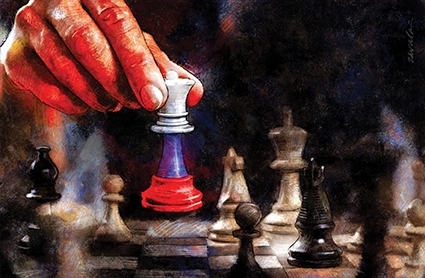On Moral Rights of Georgia’s Foreign Policy
OP-Ed
In geopolitics, there are no right or wrong sides. Each party pursues its own interests. Take the EU or the US. Both expand their influence in various parts of Eurasia and especially in the former Soviet space. Take Russia, which confronts European/American stratagems and does what it can to project its own influence in the region.
However, in Georgia, many believe that Russia does not have the moral right to influence the country any longer (because of the difficult past), while in Russia, numerous politicians think that it is Georgia that does not have the moral right to follow a western path (because we have close historical ties). This “moralization” of international relations rooted in and influenced by a history of relations, for instance, between Georgians and Russians, is a strange and, I would argue, superfluous notion.
This is particularly so as we live in an era where moral rights do not really help in international relations. We live in an era where a strong economy, education and the military balance of power decide much of things. In other words, we live in an epoch of geopolitics, and whoever is stronger, Russia or US/EU, has its influence spread, for example, to the former Soviet space.
Surely, much depends on what this or that people on the ground actually want in terms of the country’s foreign policy. But it also often happens that big actors can foster support for their cause even if it seems that there is no solid foundation for it. In Georgia, despite a decades-long unequivocal pro-western foreign policy, some people are still pro-Russian, and no one knows how big support will be for pro-Russian policies if the EU/US decreases support of Tbilisi.
We also live in the epoch when the US, major player and initiator of global projects such as the League of Nations (after WWI) and the United Nations (after WWII), introduced a new security strategy purely based on political realism. The realism where major players on the Eurasian continent are regarded with suspicion.
Indeed, the new National Strategy document of the US quite openly states that “after being dismissed as a phenomenon of an earlier century, the great power (i.e. geopolitics – E. A.) competition has returned.” It is a striking admission on behalf of the White House, and although in Europe and elsewhere, the dominant nature of the new “strategy document” might raise questions, in the South Caucasus many would think that it is more attuned to the geopolitical situation on the ground.
Thus, when we talk about where Georgia’s place is in international relations, and how successful Tbilisi can be in NATO/EU integration, the main point is that the country is in the midst of a geopolitical battle based on pure military and economic calculations: a battle where moral rules serve little and where history is important, but not decisive. In the geopolitics of the modern period, as it was in earlier centuries, economic assets such as railways and pipelines could relate you closer to a country/bloc than a shared history or moral rights.
We live in an interesting period when the Europe is in full march towards the former Soviet space. The process is still slow, but it is steady. Just compare what the map this region was in 1991. A full 26 years has passed, and we already have Ukraine, Moldova and Georgia partially related to the EU. Indeed, the argument laid out here, that in geopolitics moral rights do not play a decisive role, is also reflected in the fact that Ukraine, a culturally and historically close nation to Russia, chose the EU.
This very decision by Tbilisi, Kiev and Chisinau is a result of who is stronger and who can be a gravitation point for neighboring states. Being stronger in the modern world means having stronger diversified economies, and a great education system and military defense capabilities.
Russia has almost all the above, but the EU has much bigger and better. This goes to the article I wrote for the last issue of GT that only the powerful development of the Russian economy will make the country a pull for neighboring countries in the region. Until then, no morality rooted in shared history and culture of, let’s say Russians and Georgians, will save Moscow. As in earlier history, in the modern world, only those will win who are stronger militarily and economically.
Emil Avdaliani teaches history and international relations at Tbilisi State University and Ilia State University. He has worked for various international consulting companies and currently publishes articles focused on military and political developments across the former Soviet space.
Emil Avdaliani












